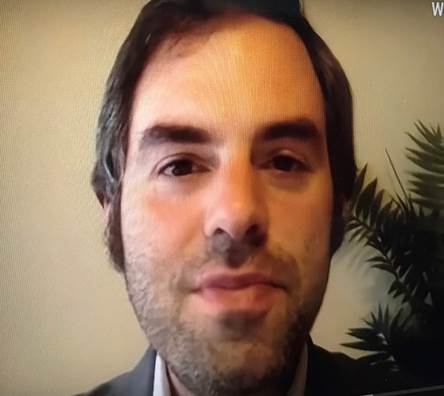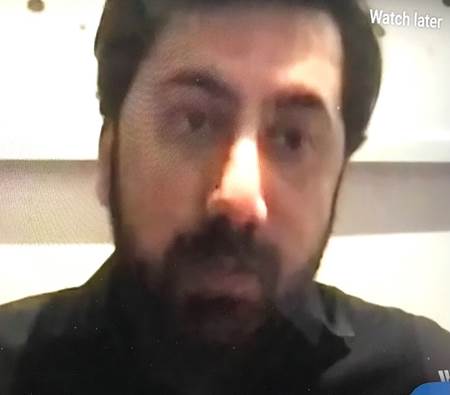

Michael Kugelman

Hussain Nadim

Nadia Naviwala
US Aid to Pakistan Discussed at Washington’s Wilson Center
By Elaine Pasquini

Washington: In his recently published book Aid, Politics and the War of Narratives in US-Pakistan Relations, Dr Hussain Nadim, critiques the United States’ aid policy for Pakistan and the politics surrounding this issue.
The author, founding director of the Peace and Development Unit of Pakistan’s Ministry of Planning Development and Reforms, serves now as the executive director of the Islamabad Policy Research Institute.
In a March 8 webinar, Nadim engaged in a comprehensive overview of his book with Michael Kugelman, director of the Wilson Center’s South Asia Institute, and Nadia Naviwala, a Wilson Center Global Fellow who has extensively researched and written on development assistance in Pakistan.
Using the Kerry-Lugar-Berman Act of 2009 (KLB) as a case study, he argues that US aid to Pakistan encourages power struggles between Washington and Islamabad and between civilian and military actors in Pakistan. The KLB provided Pakistan with $1.5 billion in annual US non-military aid until 2014.
In addition, the KLB was deeply rooted in the prevailing philosophy of a “security-development nexus” that “there is no security without development and no development without security,” which emerged under Kofi Anan at the UN in 1994.
But the framing of this discourse of security and development within a large institution like the US government was not easy. The State Department was trying to win hearts and minds with aid, while the CIA was collecting data for drone strikes and USAID wanted to build something more sustainable. “The short-term goal of the US State Department trumped the long-term development goals of USAID in Pakistan, and it was a colossal failure,” he argued. “The hype and narrative around KLB was so much that people were asking [why] there was so much aid and yet so little development.”
Pointing out that the US is one of Pakistan’s oldest partners, it’s only natural Washington has a lot of influence on its South Asian ally. “There is no denial the US is involved in Pakistan’s social, political structures,” Nadim stated.
But through researching data and conducting interviews, Nadim concluded that Pakistan has essentially “placed the US where it wanted the US to be placed and when Pakistan didn’t want to budge on Afghanistan it didn’t, despite whatever the US wanted to do or not.”
When it comes to foreign policy narratives, however, the US has an interest in Pakistan, he said, “but it does not have that level of interest in Pakistan to actively define, shape or develop narratives around Pakistan.”
The US-Pakistan relationship is one where both parties have “played on each other’s vulnerabilities instead of building on each other’s strengths,” he added.
All politics are really domestic in Pakistan, Nadim observed, and “its foreign policies are a good reflection of what the domestic policy looks like.”
The narratives espoused in Washington, Nadim insisted, are ones that “have actually been produced in Islamabad in diplomatic meetings, our experts, our politicians our diplomats, our ex-diplomats talking at the embassy functions.” But he strongly believes that powerful civilian voices from Pakistan have the ability to shape the international narratives, also.
According to Nadia Naviwala, KLB was supposed to exemplify a new way of doing assistance. “It also wanted to give the State Department more space in the relationship,” she explained, “and a way to do things differently.”
KLB, she opined, is an “excellent case study” on the powerful role of Congress in US foreign policy which is not well-understood in Pakistan. “What’s clear is the US-Pakistan relationship is a very executive-to-executive relationship; it’s a military-to-military relationship; it’s an intelligence-to-intelligence relationship. And Pakistan has never been very well able to really affect Congress on the congressional side of things.”
Since Congress decides US financial budgets, “if Pakistan gets aid, it is because Congress approved it,” she added.
KLB was a major win for the Pakistani security establishment in terms of keeping the US engaged in the region. “After all of these years, Pakistan got what they wanted out of it,” Naviwala stressed.
While KBL was considered a major shift in US aid to Pakistan as it increased economic aid, it’s important to remember, Naviwala pointed out, that all assistance – even for climate related finance… “has conditions and aims around behavior change. So, it’s not surprising that when the West has national security concerns with Pakistan it is going to use every tool in its toolbox to at least try to achieve those aims.”
Turning to the US’s interest in Pakistan since its withdrawal of troops from Afghanistan, Kugelman questioned what role Washington might play going forward with regard to trade and business opportunities with Pakistan.
“The US government has a particular level of influence where it can help but it has to be a private sector relationship,” Nadim emphasized. The US, he argued, will probably not be expanding its economic development sector work in Pakistan. “It’s not a priority country to the US especially at the expense of India. In Washington, I think there is still confusion about what to do with Pakistan,” he added.
“When it comes to the economic and trade side…we have fewer talking points, mainly regarding travel advisories and access to financial markets,” Nadim said. “But the private sectors must work together.”
For US companies to be enthusiastic about doing business in Pakistan, the bureaucratic process and clearances must be made simpler, Nadim said. If the private sector, not government security departments, handles foreign business opportunities in Pakistan, “you will see US companies coming here,” he insisted.
(Elaine Pasquini is a freelance journalist. Her reports appear in the Washington Report on Middle East Affairs and Nuze.Ink.)

